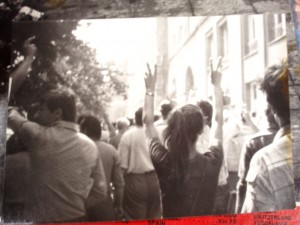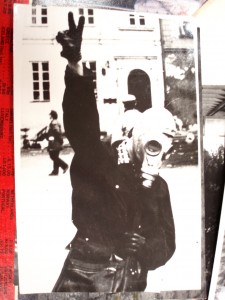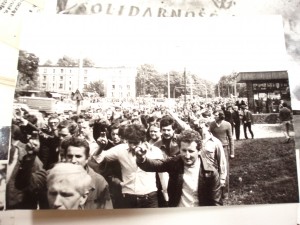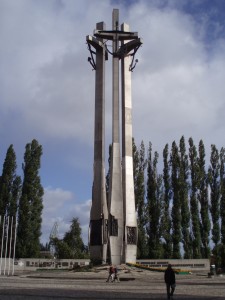By: Shannon Lough
Ukraine’s violent revolution has some reflecting on 1989 and Solidarity in Poland, an example of a national movement that brought peaceful change and the end of communism twenty-five years ago.

Solidarność (Solidarity) began during shipyard strikes in Gdańsk, led by Lech Wałęsa. In 1980, the first independent trade union formed in the Soviet bloc, and the sentiment of solidarity spread throughout the country.
The Soviets reacted by imposing martial law but the peaceful revolution prevailed. In Feb. 1989 round table talks began between the communist party and the leaders of Solidarity.
On June 4, elections were held and Solidarity led the new government. This day was marked by Poles around the world as “unbelievable” says Jan Grabowski, a history professor at the University of Ottawa.

Grabowski was in Canada during the elections. He left Poland in 1988 when the regime loosened travel restrictions. He said he regretted leaving had he known freedom was so close.
“I simply thought that communism was this rock that would never budge,” Grabowski said. “I thought there was no future for any young person in Poland.”
During the eighties, Grabowski became a member of the Independent Student Union, an affiliate of Solidarity.
He printed leaflets and brochures he would scatter from the top of apartment buildings to inviting the people below to demonstrations, Grabowski said.
Once his landlord threw him out of his apartment and he carried a printing machine through the streets of Warsaw.
“I was wandering the streets of my fair city waiting to get arrested for this kind of behaviour,” he said.
He found refuge in his cousin’s apartment and continued his activity there. But after four years, his participation ended because he said he got tired of looking over his shoulder.
After the elections the communist oppression ended.

The political counselor at the Polish Embassy in Ottawa, Andrzej Farafa, was only nine-years-old at the time of the elections but he still remembers the severe food shortages.
“The economy was underdeveloped before change,” Farafa said who attributes economist Leszek Balcerowicz for successfully replacing the communism model with free-market reforms.
A contemporary Poland looks much different these days with shopping malls and well-stocked grocery stores. Farafa said it will be hard for his kids to understand the way things once were in Poland.
Lech Wałęsa, as the first President of the Republic of Poland, introduced capitalism and focused on foreign relations with the West.
Poland became a member of NATO in 1999. Since then, Polish troops have fought in Iraq and Afghanistan.
In 2004, Poland joined the European Union but continues to use its own złoty currency. Working with neighbouring countries is a form of Solidarity, said Farafa.
“It’s a reasoning that we use with the European states, you need to be a team player to achieve more,” Farafa said.
While high debts caused the European financial crisis in 2009, Poland was the only EU member nation to continue economic growth.

The introduction of capitalism and globalization brought success to the country along with some challenges.
Poland has an unemployment rate of 14 percent and reports say after joining the EU, economic migration increased and people left to find job opportunities elsewhere.
The sense of national unity has faded and for Krzysztof Kasprzyk, an original supporter of the revolution, some “people forgot about many lessons from Solidarity,” he wrote.
The origins of the revolution may be lost among the generation who were too young to remember tanks in the streets and military rule during martial law.
Farafa said people still refer to movement. It’s a reminder that if “we really want something we can unite and we can make a change,” he said.
Whatever happened to story
Documentation
Shannon Lough
Feb. 26, 2014
I had several interviews. The first was with Jeff Sallot, who worked for the Globe & Mail’s Moscow bureau during the collapse of the Soviet Union. He provided me with solid background information on the elections and the Solidarity movement.
The second interview was Jan Grabowski, a history professor at the University of Ottawa. The third interview was with Andrzej Farafa from the Polish Embassy. I also reached out to the Polish consulate in Toronto who connected me through e-mail with other sources including Krzysztof Kasprzyk, who wrote the unofficial anthem for the Solidarity movement.
The idea came from a document I obtained while studying in Poland. I got it while I was in Gdansk, where I learned about the Solidarity movement. It’s a transcript of an international conference held in Warsaw on discussing the 25th anniversary of the Independent Trade Union, Solidarnosc. I decided to do my story on the success of the Solidarity movement by overthrowing the oppressive communist regime in 1989.
I took the photo of the memorial in Gdansk in 2007, and the Solidarity photos I photographed copies of from a professor at Jagiellonian University in Krakow.
For my two documents:
Transcript of an interview with Jan Grabowski (attached)
I found him through searching online for people in the area that were specialists in Polish politics. I noticed that on the professor’s website his profile stated he had been in Warsaw in the 1980s and I contacted him for an interview on the subject.
The interview was extremely helpful because his memories were full of colour and he brought life to the story. He is also aware of Poland’s current situation because he travels four to five times a year for his work.
Transcript of the International Coference in Warsaw-Gdansk, August 29-31, 2005

I found the document while I was sorting through my books back at my parents house. I obtained the book while I was studying in Poland. I went on a trip to Gdansk to learn about the political history of the area and visited the memorial at the shipyard. I was given the text there.
It was helpful because it’s a reflection on the Solidarity movement by important figures within Poland. The most useful section was on the legacy of the movement and how it changed Poland after overthrowing communism.
Jan Grabowski
Professor/Professeur titulaire
Department of History/Département d’histoire
University of Ottawa/Université d’Ottawa
Desmarais Hall, room 9117, 55 Laurier East
Ottawa, Ontario K1N 6N5
(613) 562-5800 # 1292
Article: Solidarity movement
Telephone interview
Possible questions:
What was the atmosphere of Poland like during the 80s?
Did you take part of the Solidarity movement?
How did you feel about the outcome of events?
What did this peaceful protest do for the Polish people and how has the affected the way Poland is today?
Jan Grabowski:
There were two periods one was the time of 1980-81, that was after the strikes when Solidarity was finally formed and created then there was martial law with several years of oppression and then you had the re-emergence of the solidarity movement in 1989.
Can you tell me about the atmosphere in Poland during this time?
Imagine one day for instance that you go out from your house in the middle of the winter, it was 13th of December 1981, you see tanks and armoured personal carriers sitting out in front of your house and your telephone does work any more. You cannot leave the country, you cannot leave even your city. Everything is under iron law of the military. People get shot for their trouble too and you know it was a bleak bleak period of time.
The hopes were so high before and then from one day to another it went into complete despair.
Were you a part of the Solidarity movement?
Oh yeah, at that time in 1980-81 I was a student. I was a member of the equivalent of Solidarity in the student movement, it was called Independent Student Union, which was a solidarity affiliate among the students. And then I became a member of the Solidarity in the underground. I was involved in the underground printing presses printing information for the Solidarity movement between December 1981- 1985. My participation stopped, you people sometimes get tired after four years looking over your shoulder whether someone is going to arrest you. You simply need a pause and I took a pause after four years.
How did you manage to leave Poland?
After several years of martial law the regime mellowed a bit. By 85-86, Poles could travel a bit abroad so you could leave the country, it wasn’t easily, its as doable.
In 1988 I was invited to continue my PhD in Canada, so I left. (To Montreal)
Have you ever returned?
Well you know, I’m a working historian and I’m doing the history of Poland so I imagine at this point I’m going four/five times I am in Poland. So you could say, yes, very often.
Can you reflect on how you felt with the votes went through in 1989?
I was extraordinarily surprised. I was leaving Poland in 1988 and I was already a trained historian by craft and I could never ever ever thought it possible. When I left in 1988 I thought there was no future for any young person in Poland. It felt like you were looking at the world through a thick wall of glass. It was sort of an un-reality we called; the rules were oblique, strange, inhuman even. Then after one year the system seemed to collapse like a house of cards.
I simply thought that communism was this rock that would never budge, at least not in my lifetime. Had I known I would never have immigrated to Canada in 88. I would have certainly stayed on until after a year or so, I had already made my commitment.
I was very very surprised and of course over joyed too.
How old were you when you left?
I left when I was 26yrs at that point.
Do you think that it was the Solidarity movement that brought the fall of communism in Poland?
The Solidarity movement was of course instrumental in bringing it down but of course everyone will tell you that simply the system started to rot in the Soviet Union. It was already very shaky. And simply Polish society and solidarity took advantage of the fact that the centre of Soviet power had started to collapse. It was good fortune for everybody. Solidarity took advantage of the fact that Moscow became weakened and the Soviet system became so ill at heart that it couldn’t control its periphery anymore.
How do you think this movement has affected Poland today?
It’s amazing, you have to go there one day, it’s open society. I am certain you would find Poles your age exactly the same as your Canadian counterparts. They are now raised in the same Western culture and Polish society has it’s problems, especially young people. It’s a normal Western society with all of it’s problems and vices but parts of it are fairly optimistic family of developed nations. It’s amazing what was done in 25yrs. It’s not as wealthy as Canadian society of course but given the point that I remember in 1988 where the only merchandise you could buy was vinegar I would say it’s a major improvement.
How did you feel about Lech Walensa becoming the leader right after?
He’s a person of historical dimension, he’s a bit larger than life and he commits huge errors and he makes wonderful decisions too so he is such a complex individual that I would be lost to describe him but I think he was much better in opposition than once he became President. Once he became President parts of his character came to the fore but once he was leader in Solidarity even the whole union, he made tremendous decisions and he was brave and we all owe him a huge debt of gratitude.
Can reflect on a moment during when you were in the underground movement?
Once I was in the little printing press, it was heavy but I could lift if off the ground. We produced underground bulletins. We as myself or one or two of my colleagues. We had to change locations because people were afraid of stuff, of helping anyone to do with the underground. I remembered one sunny winter morning it was in 1983, in the midst of a very severe winter, my landlord threw me out with this printing machine and in my backpack I had a few thousand sheets of paper and stuff you need to print and I had no where to go with the bloody thing. Because nobody wanted to lend me their space anymore. That was an utter disappointment. People after two years of hiding in the underground movement were tired. I was wandering the streets of my fair city waiting to get arrested for this kind of behaviour. Finally I found a place with my very old cousin. She was then in her 80s and she remember still the partition and occupation of Poland in WWI. And she opened her very modest apartment and she invited me in. And that’s where I was producing the brochures and the information leaflets for Solidarity for some time.
What kind of things did you print?
Normally it was simply 100,000 leaflets inviting people to demonstrations. Or appeals ordered to liberate political prisoners. I would print these leaflets, cut them, and throw them out from different buildings so they would be spread out to the crowds downstairs. Sometimes our little shop would produce internal bulletins for Solidarity. Whatever was required basically by the Warsaw Solidarity organization.
Did you ever go to Gdansk?
Of course many times but without Solidarity.
What can you say of the spirit of the Polish people during this movement?
Once again, I was at that point in Canada so I was a secondary witness. I can only tell you what my friends and family said that everyone felt absolutely and unbelievably happy especially during the June 1989 elections where suddenly people found out that they could actually a vote.That they could vote for their people. It was so novel and so absolutely unbelievable. For me the equivalent was in Aug. 31. 1980 when Solidarity became legal, it was absolute discovery that my goodness things can change.

